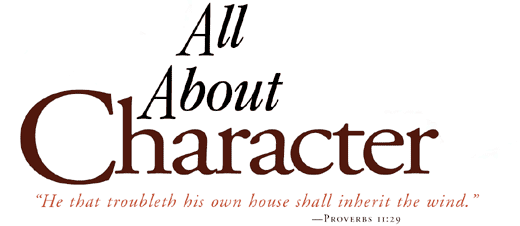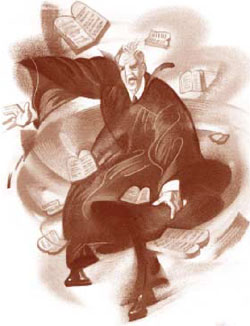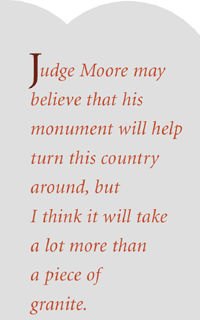All About Character
John W. Whitehead January/February 2004
In 1960 playwrights Jerome Lawrence and Robert E. Lee immortalized the Scopes "monkey trial" in their classic drama Inherit the Wind. The play told of the legal battle that took place in Dayton, Tennessee, over the teaching of evolution in public schools.

Moore's supporters, many of whom have made a career of mixing religion and politics, include such personalities as Alan Keyes and the Reverend Jerry Falwell. With Montgomery, Alabama, as their backdrop, Moore and his followers have been borrowing heavily from the rhetoric of the civil rights movement. With choruses of "We Shall Overcome" wafting through the air, they have drawn some dubious parallels between their attempts to entrench the Ten Commandments in the state courthouse and the struggle by African-Americans for equal rights.
I say dubious because this struggle over Moore's Ten Commandments monument has little to do with civil rights or religious freedom. For much of the past century, African-Americans endured physical hardships, discrimination, and even death. However, making this Ten Commandments debacle the poster child for the discrimination endured by Christians today—which is what Moore and his supporters have done—is to minimize greatly the horrific torture many Christians suffer worldwide in order to live out their sincere religious beliefs.
Furthermore, the ramifications of this politically charged issue over a granite monument could have some lasting negative effects on the rights of religious people to sincerely express their religious beliefs in other forums.
If Moore continues to push this particular issue, as he seems inclined to do, we could very well see all Ten Commandments plaques and monuments removed from courthouses and public places. In fact, his ill-chosen battle could make it that much harder for the public school teacher to reference religion in the classroom or the high school valedictorian to reference God in a graduation speech.
If Moore continues to insist that the Ten Commandments belong in the courthouse because this is a "Christian nation," we could very well see a backlash against all things Christian. As one person asked me recently: "Why do you Christians have to shove your religion down our throats?" That, in effect, is how many people view Judge Moore's actions—as another attempt by Christians to foist their beliefs on the rest of the country.

Judge Moore may believe that his monument will help turn this country around, but I think it will take a lot more than a piece of granite. What good is a monument to the Ten Commandments if no one takes the time to live by them? When Christ was asked to name the greatest commandment, He responded, "Love the Lord your God. And a second is like it: Love your neighbor" (see Matthew 22:37-40). In other words, one loves God by helping those in need.
The circus surrounding Moore's monument has little to do with loving one's neighbor. When this spectacle becomes yesterday's news, what will have been the impact on people's lives? No unborn babies were saved. No poor people were fed. No one oppressed for their religious beliefs was helped. And no one was shown love and compassion.
This isn't a political issue involving the left and the right wing. And what's wrong with our country isn't the absence of Ten Commandments monuments. Moore's followers may sincerely believe that a monument will right everything that's wrong. People on both sides of this issue may insist that it's all about the law, but it's really about people in our society who are adrift and without hope.
People need a hero. And there are very few heroes anymore who are taking strong moral stands. Right now the closest thing to a hero many Christians can find is Judge Moore, who at least is taking a stand. But his solution to our problems will not make America any more moral or religious. And Christians are in a sad state if they think it will.
Do you really think that the God who created the universe would choose to fight over a little monument in Alabama? Can we really believe that God, the great Creator, wants us to show love and compassion by fighting over a two-and-a-half-ton piece of granite?
Judge Moore is no Moses, leading his followers to the Promised Land. And Christianity, as it is being practiced today, is not the fix for what's wrong with America. Thus, it turns out that this debate is really not about what's wrong with America; it's about what's wrong with Christianity.
As Martin Luther King, Jr., who marched into Montgomery under the banner of civil rights, remarked, "the judgment of God is upon the church as never before. If today's church does not recapture the sacrificial spirit of the early church, it will lose its authenticity, forfeit the loyalty of millions, and be dismissed as an irrelevant social club with no meaning for the twentieth century."
If Christians really want to have a positive impact on the world around them, let them return to their communities and tend to the sick, feed the poor, and stand up for the weak and the defenseless. Then maybe there will be no need for monuments.
______________________
Constitutional attorney and author John W.Whitehead is founder and president of the Rutherford Institute in Charlottesville, Virginia.
______________________
Article Author: John W. Whitehead
John W. Whitehead, founder and president of the Rutherford Foundation, writes from Charlottesville, Virginia.